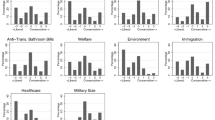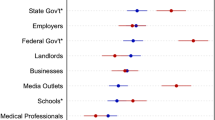Abstract
What impacts people’s willingness to restrict the civil liberties of suspected terrorists? For decades, social scientists have studied the dynamics that shape political tolerance, and increasingly, scholars examine the effects of terrorism for people’s willingness to limit civil liberties in pursuit of security. We argue that the social categorization of a suspected terrorist (e.g., White Nationalist or Islamic Fundamentalist) is consequential for civil liberty attitudes in the United States, but, importantly, we theorize that the effects are contingent on partisanship. We implement question-wording experiments in four surveys. Three of the studies are comprised of national samples implemented at different points in time; a fourth sample incorporates a targeted sample of U.S. military servicemembers. We find evidence that partisanship moderates the effects of terrorist categorization such that Republicans are less likely to restrict the civil liberties of White Nationalists than unspecified suspected terrorists. By contrast, Democrats are more inclined to restrict the civil liberties of White Nationalists. At times, partisanship also moderates the effects of an Islamic Fundamentalist categorization. The study has implications for political tolerance, partisanship, and attitudes toward terrorism in contemporary politics.




Similar content being viewed by others
Notes
We employ these labels because they are routinely used in elite rhetoric discussing terrorism. We examine the impact of these labels for public opinion. We do not analyze the extent to which terrorism is linked to these categorizations.
Characteristics that influence support for civil liberties are contingent on the tolerance measure (Gibson, 2013).
Flores et al. (2018) summarize social categorization theory as the “process through which people categorize others” which “conditions their attitudes and behaviors toward them” (198).
Avdan and Webb (2019) argue "People attribute heinous acts to inherent out-group characteristics" and "dismiss similar behaviors by members of their own communities attributing these behaviors to situational factors and labeling them atypical" (92).
Substantial proportions of Democrats and Republicans likely identify both Islamic Fundamentalists and White Nationalists as out-groups. As such, we think elite framing—in conjunction with in and outgroup dynamics—helps explain partisan differences in threat perceptions.
We also implemented a pre-test using Amazon Mechanical Turk (Supplemental Materials).
These are not probability-based population samples, but they are more representative of our target populations than other convenience samples (e.g., student, MTurk samples). And, online convenience samples can provide inferences about treatment effects that are indistinguishable population-based samples (Coppock et al., 2018).
We analyze average treatment effects in our Supplemental Materials (no controls or interactions with partisanship). However, ATEs may mask treatment effects conditioned by respondent partisanship.
Table 1 provides information about the statistical significance of within-party group comparisons, but this is not the main test of our hypothesis.
There was another experiment on a different topic in this Qualtrics survey and we control for those manipulations; they do not impact our dependent variables (Supplemental Materials).
References
Altemeyer, B. (1996). The authoritarian specter. Harvard University Press.
Avdan, N., & Webb, C. (2019). Not in my back yard: Public perceptions and terrorism. Political Research Quarterly, 72(1), 90–103.
Baele, S. J., Sterck, O. C., Slingeneyer, T., & Lits, G. P. (2017). What does the “Terrorist” label really do? Measuring and explaining the effects of the “Terrorist” and “Islamist” categories. Studies in Conflict & Terrorism, 42(5), 520–540.
Barrow, B. (2019). “Biden: Trump ‘Using the Language’ of ‘White Nationalists’.” PBS News Hour. Retrieved May 4, 2021, August 7 from https://www.pbs.org/newshour/politics/biden-trump-using-the-language-of-white-nationalists
BenYishay, A., & Betancourt, R. (2014). Unbundling democracy: Political rights and civil liberties. Journal of Comparative Economics, 42(3), 552–568.
Billig, M., & Tajfel, H. (1973). Social categorization and similarity in intergroup behavior. European Journal of Social Psychology, 3(1), 27–50.
Campbell, A., Converse, P. E., Miller, W. E., & Stokes, D. E. (1960). The American voter. Wiley.
Chong, D., & Druckman, J. N. (2007). Framing theory. Annual Review of Political Science, 10, 103–126.
Christensen, D. A., & Aars, J. (2019). Counterterrorism policies and attitudes towards out-groups: Evidence from a Survey Experiment on Citizens’ Attitudes Towards Wiretapping. Political Behavior, 43, 997.
Cineas, F. (2020). Trump was asked to denounce White Supremacy. He Wouldn’t.” Vox, Retrieved May 4, 2021 from https://www.vox.com/2020/9/29/21494841/trump-proud-boys-stand-white-supremacy
Cohrs, J. C., Kielmann, S., Maes, J., & Moschner, B. (2005). Effects of right-wing authoritarianism and threat from terrorism on restriction of civil liberties. Analyses of Social Issues and Public Policy, 5(1), 263–276.
Coppock, A., Leeper, T. J., & Mullinix, K. J. (2018). The generalizability of heterogeneous treatment effect estimates across samples. Proceedings of the National Academy of Sciences, 115(49), 12441–12446.
Davis, D. W., & Silver, B. D. (2004). Civil liberties vs. Security: Public opinion in the context of the terrorist attacks on America. American Journal of Political Science, 48(1), 28–46.
Flores, A. R., Haider-Markel, D. P., Lewis, D. C., Miller, P. R., Tadlock, B. L., & Taylor, J. K. (2018). Challenged expectations: Mere exposure effects on attitudes about transgender people and rights. Political Psychology, 39(1), 197–216.
Gadarian, S. K. (2010). The politics of threat: How terrorism news shapes foreign policy attitudes. The Journal of Politics, 72(2), 469–483.
Gibson, J. L. (2006). Enigmas of intolerance: Fifty years after Stouffer’s communism, conformity, and civil liberties. Perspectives on Politics, 4(1), 21–34.
Gibson, J. L. (2013). Measuring political tolerance and general support for pro-civil liberties policies: Notes, evidence, and cautions. Public Opinion Quarterly, 77(S1), 45–68.
Goodwin, R., Willson, M., & stanley, G. (2005). Terror threat perception and its consequences in contemporary Britain. British Journal of Psychology, 96, 389–406.
Gray, R. (2017). Trump defends White-Nationalist Protesters: ‘Some very fine people on both sides.’” The Atlantic. Retrieved May 4, 2021 from https://www.theatlantic.com/politics/archive/2017/08/trump-defends-white-nationalist-protesters-some-very-fine-people-on-both-sides/537012/
Hetherington, M. J., & Suhay, E. (2011). Authoritarianism, threat, and Americans’ support for the war on terror. American Journal of Political Science, 55(3), 546–560.
Huddy, L., Feldman, S., Taber, C., & Lahav, G. (2005). Threat, anxiety, and support of antiterrorism policies. American Journal of Political Science, 49(3), 593–608.
Huff, C., & Kertzer, J. D. (2017). How the public defines terrorism. American Journal of Political Science, 62(1), 55–71.
HuffPost & YouGov. (2019). Conducted August 5–6, 2019. Retrieved May 4, 2021 from https://big.assets.huffingtonpost.com/athena/files/2019/08/08/5d4c8406e4b0066eb70ee689.pdf
Kam, C. D., & Trussler, M. J. (2017). At the nexus of observational and experimental research. Political Behavior, 39, 789–815.
Kohn, R. (2002). The erosion of civilian control of the military in the United States today. Naval War College Review, 55(3), 8–59.
Kuruvilla, C. (2021). White Christian radicalization is a violent threat. HuffPost. Retrieved May 4, 2021 from https://www.huffpost.com/entry/white-christian-nationalism-capitol-riot_n_5ff73916c5b612d958ea19db
Leeper, T. J., & Slothuus, R. (2014). Political parties, motivated reasoning, and public opinion formation. Advances in Political Psychology, 35(Supplement 1), 129–156.
Madhani, A. (2019). White Nationalists could have firearms taken under red flag law proposed by Kamala Harris. USA Today. Retrieved May 4, 2021 from https://www.usatoday.com/story/news/politics/elections/2019/08/14/kamala-harris-pitches-a-red-flag-law-targeting-white-nationalists/2009237001/
Marcus, G. E., Sullivan, J. L., Theiss-Morse, E., & Wood, S. L. (1995). With Malice toward some: How people make civil liberties judgments. Cambridge University Press.
Morning Consult and Politico. (2019). National Tracking Poll #190346. Conducted Mar. 22–24, 2019. Retrieved May 4, 2021 from https://www.politico.com/f/?id=00000169-bbb6-d666-af7d-bfbf6f370001
Nelson, T. E., Clawson, R. A., & Oxley, Z. M. (1997). Media framing of a civil liberties conflict and its effect on tolerance. American Political Science Review, 91(3), 567–583.
Oliphant, J., & Whitesides, J. (2019). Former VP Biden’s 2020 bid reshapes White House race. Reuters. Retrieved May 4, 2021 from https://www.reuters.com/article/us-usa-election-biden/former-vp-bidens-2020-bid-reshapes-white-house-race-idUSKCN1S10CX
Peffley, M., & Rohschneider, R. (2003). Democratization and political tolerance in seventeen countries: A multi-level model of democratic learning. Political Research Quarterly, 56(3), 243–257.
Pettigrew, T. F. (1979). The ultimate attribution error: Extending Allport’s cognitive analysis of prejudice. Personality and Social Psychology Bulletin, 5(4), 461–476.
Powell, K. (2011). Framing Islam: An analysis of U.S. media coverage of terrorism since 9/11. Communication Studies, 62(1), 90–112.
Prothro, J. W., & Grigg, C. M. (1960). Fundamental principles of democracy: Bases of agreement and disagreement. Journal of Politics, 22(2), 276–294.
Siddiqui, S. (2016). Trump and a Muslim Registry: Does he want one and is it even possible? The Guardian. Retrieved May 4, 2021 from https://www.theguardian.com/us-news/2016/nov/27/donald-trump-muslim-registry-policy-possibility
Stouffer, S. C. (1955). Communism, conformity, and civil liberties. Doubleday.
Sullivan, J., Pierseson, J., & Marcus, G. E. (1982). Political tolerance and American Democracy. University of Chicago Press.
Tajfel, H. (1978). Social categorization, social identity, and social comparisons. In H. Tajfel (Ed.), Differentiation between social groups (pp. 27–60). Academic Press.
Wade, P. (2019). Republicans and fox news: White nationalist violence has nothing to do with white nationalism. Rolling Stone. Retrieved May 4, 2021 from https://www.rollingstone.com/politics/politics-news/republicans-and-fox-news-white-nationalist-violence-867294/
Weldon, S. A. (2006). The institutional context of tolerance for ethnic minorities: A comparative, multilevel analysis of western Europe. American Journal of Political Science, 50(2), 331–349.
Acknowledgement
The authors thank Rob Norris, Dave Ciuk, Kal Munis, Toby Bolsen, and Nazli Avdan for their feedback on earlier versions of this manuscript.
Author information
Authors and Affiliations
Corresponding author
Additional information
Publisher's Note
Springer Nature remains neutral with regard to jurisdictional claims in published maps and institutional affiliations.
Replication Materials: https://doi.org/10.7910/DVN/ITWSK2
Electronic supplementary material
Below is the link to the electronic supplementary material.
Appendix
Rights and permissions
About this article
Cite this article
Caton, C., Mullinix, K.J. Partisanship and Support for Restricting the Civil Liberties of Suspected Terrorists. Polit Behav 45, 1421–1445 (2023). https://doi.org/10.1007/s11109-022-09771-9
Accepted:
Published:
Issue Date:
DOI: https://doi.org/10.1007/s11109-022-09771-9




